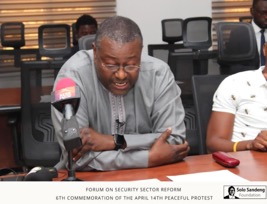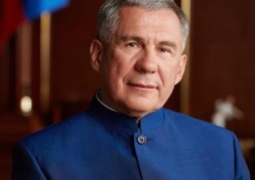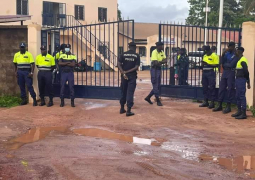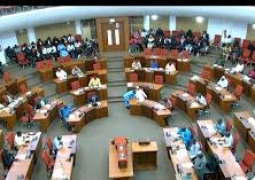
Part of the discussion involved the TRRC recommendations on the Security Sector Reform in The Gambia, preparedness to carry out reforms within the police pending the government White paper, and the possibility of boosting the capacity of police crowd control and de-escalating situations.
Additionally, disciplinary and accountability measures within the police against officers involved in misconduct was discussed, life-long physical and mental implications for victims of the police, legal perspective of accountability for acts of brutality and also the role of Civil Society Organisations in Security Sector Reforms.
Emmanuel D. Joof, chairman of the National Human Rights Commission in his statement, said the commemoration was very important because it is dedicated to a life matter.
According to him, Solo Sandeng was ‘brutally’ killed in the custody of the National Intelligence Agency (NIA) under Yahya Jammeh on the 14th April 2016, after leading a peaceful and non-violent protest that sought for electoral reform and the end of impunity against citizens of The Gambia.
Speaking via zoom, Fatoumatta Sandeng, daughter of the late Solo Sandeng, who doubles as president of the foundation, said her father sacrificed his life for The Gambia to be free from a dictatorship.
However, she added that the April 14th 2016 peaceful protest was not an individual’s day, but rather a day for all Gambians to be free from dictatorship.
Aboubacarr Gibba, representative of the Ministry of Interior, said the Security Sector Reforms is a very important programme for the Gambia government because it aims to bring the impacts of the development they are doing.
John Charles Njie, chairman of TANGO, spoke at length about the role of the Civil Society Organisation in implementing the Security Sector Reforms.
Mr. Njie said all Civil Society Organisations should stick to the truth if they want the country to go forward because they should not be favouring anyone, but rather to be truthful.
Read Other Articles In Headlines

OIC: Gambia an example of religious tolerance, says Tartastan Head of State
May 3, 2024, 11:27 AM




